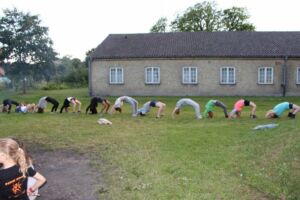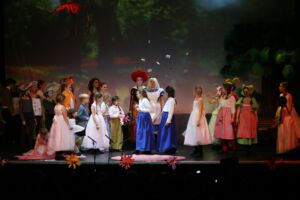Education
Children love to perform, so why not put them on the stage?
This article is more than 10 years old.
For seven years now, the performance schools Scene Kunst Skoler have been nurturing and fulfilling the talents of Danish and international children of all abilities

“Baby, look at me, and tell me what you see? Fame, we’re going to live forever.”
If I could go back 20 years, I would beg my mother to send me to Scene Kunst Skoler, a group of performance schools in Zealand that focuses on the three key components of musicals: dancing, singing and acting.
It’s the dream school every child wants to attend when they are young – particularly if you were the type that dressed up in the mirror pretending to be Mary Poppins – and the length of the waiting list for some of its 16 schools underlines how popular it is.
Last week I visited one of Scene Kunst Skoler’s summer camps at a lovely location in Holmen just around the corner from Christiania, where the enthusiasm of the children in attendance spoke volumes about their enjoyment and fulfillment. Their happiness shone through their words.
The camp allows them to fully immerse into the three disciplines for a full week (with a little free time for trips to the beach) – a step up from the normal three hours of hard work they do every week.
And it’s all goal-orientated. Most of the training will ultimately lead to a performance, either in June or December, which is often at a fancy theatre (this year’s Christmas show is at Det Ny Teater). It’s a great day out for proud family to see the results of their endeavour.
“Many parents have told us after seeing our plays that they forget they are watching children because of the professionalism the kids show, which is an honour to hear,” enthused its British co-founder Russell Collins.
16 schools and counting
Collins and his Danish wife Christina Anthony saw a huge gap in the market when they came up with the idea, as their expansion has been meteoritic since they opened their first school in Køge in 2008.
“We were unsure about how the school would be received in Denmark,” said Collins. “Especially since every Dane we knew was telling us it would never work.”

Scene Kunst Skoler hasn’t stopped growing since. Today, in total, they have 16 schools: 13 in Danish and three international,
But don’t worry readers, as they will soon be opening another international school at Copenhagen International School in Hellerup. So for those who have been waiting for a spot, this is your moment!
Children as young as four attend the mini schools (4-6 years old), after which they graduate to the main school that welcomes youngsters up to the age of 18, normally split into three age brackets for learning purposes.
Welcomes all abilities
I spoke to several children who have been attending the school for seven years now, and their joy when they describe how much they’ve learned and all the progress they have made was wonderful.

Progress is a key word here, as children of all abilities attend the school, and all of them get a part in the biannual productions. But hidden talents are there to be uncovered, and the staff of highly experienced professionals Collins has assembled are adept at getting the best out of each and every student.
“Ultimately, it’s all about the positive experience we can give them,” said Collins, who is himself an actor and trained director, as is his wife.
“Each student is equally important to us. It is not only about teaching them skills in acting, dancing or singing, but about improving the child’s self-confidence, making friends and teamwork. And, of course, having fun.”













































